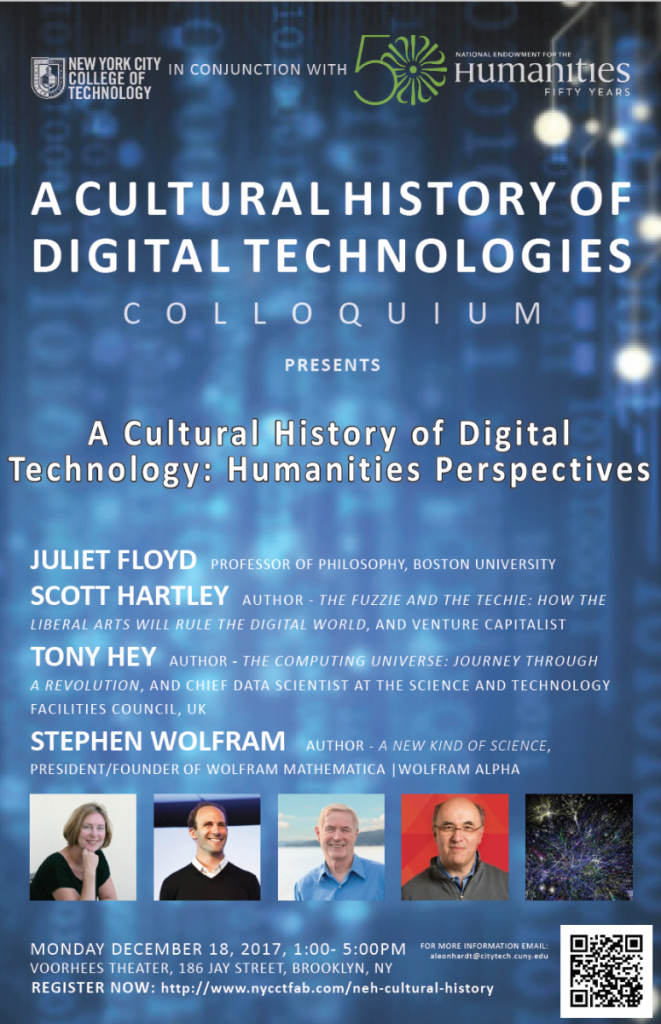Category Archives: Uncategorized
SF Symposium Videos
If you couldn’t make it to the 2nd Annual City Tech Science Fiction Symposium, you can watch videos of all of the presentations including Samuel R. Delany’s keynote address here.
Extra Credit Opportunity: Cultural History of Digital Technology
A CULTURAL HISTORY OF
DIGITAL TECHNOLOGIES
C O L L O Q U I U M
PRESENTS
A Cultural History of Digital Technology: Humanities Perspectives
MONDAY DECEMBER 18, 2017, 1:00- 5:00PM
VOORHEES THEATER, 186 JAY STREET, BROOKLYN, NY
JULIET FLOYD PROFESSOR OF PHILOSOPHY, BOSTON UNIVERSITY
SCOTT HARTLEY AUTHOR – THE FUZZIE AND THE TECHIE: HOW THE LIBERAL ARTS WILL RULE THE DIGITAL WORLD, AND VENTURE CAPITALIST
TONY HEY AUTHOR – THE COMPUTING UNIVERSE: JOURNEY THROUGH A REVOLUTION, AND CHIEF DATA SCIENTIST AT THE SCIENCE AND TECHNOLOGY FACILITIES COUNCIL, UK
STEPHEN WOLFRAM AUTHOR – A NEW KIND OF SCIENCE, PRESIDENT/FOUNDER OF WOLFRAM MATHEMATICA |WOLFRAM ALPHA
FOR MORE INFORMATION EMAIL:
aleonhardt@citytech.cuny.edu
REGISTER NOW: http://www.nycctfab.com/neh-cultural-history
Register to attend and write about the presentations that you visit. In at least 250 words, tell me who you heard speaking, what you learned, and how their work connects to something that you learned in our class.
William Hart-Davidson’s “On Writing, Technical Communication and Information Technology: The Core Competencies of Technical Communication”
For your last after class writing assignment, post a comment of at least 250 words summarizing your reading and today’s lecture on William Hart-Davidson’s “On Writing, Technical Communication and Information Technology: The Core Competencies of Technical Communication.” In particular, connect this reading to those that we’ve seen before (e.g., Ong and Derrida).
Jacques Derrida’s “Signature Event Context”
After today’s class, write at least 250 words summarizing the reading and class lecture on Jacques Derrida’s “Signature Event Context.” Consider why this reading is important to the work that we do as technical communicators.
Also, remember that William Hart-Davidson’s “On Writing, Technical Communication, and Information Technology” is in dialog with Derrida’s speech. When you read Hart-Davidson’s essay, reflect on how discourse is formed and taking place through these and our past readings.
Marie Hicks’ Programmed Inequality
After today’s class, write at least 250 words summarizing your reading of the introduction from Marie Hicks’ Programmed Inequality. Based on our lecture and discussion, consider how the enforcement of gender roles in the computing industry has an effect on the technologies made and those technologies’ effect, in turn, on language. During the semester, we’re working toward a glimpse of the complexity behind the connection between language and technology. This reading adds another layer to our overall view of these relationships.
Science Fiction Symposium, Dec 6, 9am-6pm
View the program here.
David Nofre, Mark Priestley, and Gerald Alberts’ ”When Technology Became Language”
After class, write at least 250 words summarizing your reading of David Nofre, Mark Priestley, and Gerald Alberts’ ”When Technology Became Language.” Consider the question: Why are programming languages referred to as languages? Are they languages in the sense that we have discussed in class this semester? Why do we use natural language in modern programming languages? What influence has programming languages had on natural language (e.g., rise of coding camps, political pressure to teach programming at scale, popularity of tools such as IFTTT)?
Anil Dash’s “The Lost Infrastructure of Social Media”
After class today, post a comment of at least 250 words summarizing your reading and the lecture on Anil Dash’s “The Lost Infrastructure of Social Media.” Feel free to reflect on the social media that you have used or are aware of and how it has changed over time. Remember to note what “Whig history” is and how it relates to digital technologies including social media.
Donald C. Jones’s “Thinking Critically About Digital Literacy: A Learning Sequence of Pens, Pages, and Pixels”
Post a comment to this blog post of at least 250 words about Donald Jones’s “Thinking Critically About Digital Literacy.” While this was a pedagogically-focused essay, connect it to the kinds of audience-specific work that we must do as effective technical communicators. Remember that we need to engage our audiences with those literacies (e.g., print vs. digital literacies) that they already have while endeavoring to help our audiences develop other literacies that might improve our current or future communications.




